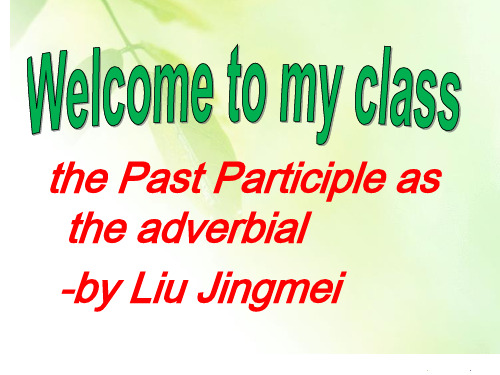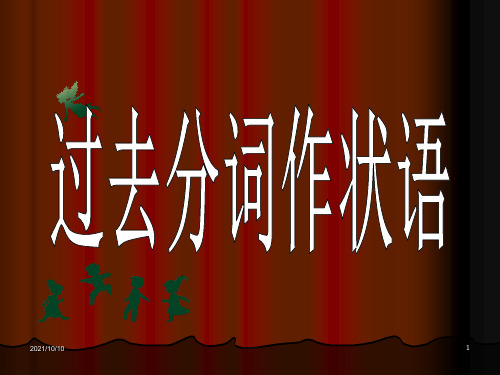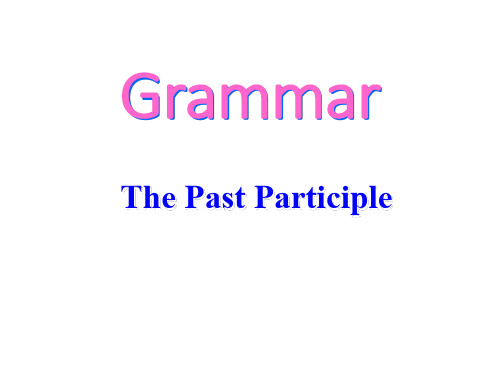高中英语语法 过去分词作状语课件(共27张)
合集下载
分词作状语(共24张PPT)

详细描述
这道练习题将提供一些含有分词作状语的错误句子,要求 学生识别并纠正错误,提高对分词作状语用法的敏感度和 准确性。
总结词
理解分词作状语在复杂句型中的作用
详细描述
这道练习题将通过一些复杂句型,让学生理解分词作状语 在句子中的衔接和修饰作用,以及如何运用分词作状语来 简化复杂句型。
总结词
掌握分词作状语与从句的转换技巧
详细描述
分词短语可以用来描述动作的目的或 意图,例如“为了减肥,我每天早上 跑步。”中的“为了减肥”就是一个 目的状语,表示“我每天早上跑步” 这个动作的目的是减肥。
让步状语
01
让步状语
分词短语表示动作发生的让步条件,通常放在句首或句末 。
02
总结词
表示动作发生的让步条件。
03
详细描述
分词短语可以用来描述动作发生的让步条件,例如“尽管 下雨了,我们还是去了野餐。”中的“尽管下雨了”就是 一个让步状语,表示“我们还是去了野餐”这个动作是在 下雨这个不利条件下发生的。
04
详细描述
这道练习题将重点讲解分词作状语的 时态和语态变化,帮助学生理解不同 时态和语态下分词的使用规则。
06
详细描述
通过这道练习题,学生将进一步提高分词作状 语的运用准确度,避免常见的语法错误,使语 言表达更加规范、准确。
练习题五
总结词
综合运用分词作状语的能力
详细描述
这道练习题将综合考察学生对分词作状语的掌握程度,要求学生在实际语境中灵活运用这一语法点, 提高综合语言运用能力。
总结词
表示动作发生的条件或前提。
详细描述
分词短语可以用来描述动作发生的条件或前提,例如“如果下雨了,我们就不去野餐了。”中的“如果 下雨了”就是一个条件状语,表示“我们就不去野餐了”这个动作发生在下雨这个条件下。
这道练习题将提供一些含有分词作状语的错误句子,要求 学生识别并纠正错误,提高对分词作状语用法的敏感度和 准确性。
总结词
理解分词作状语在复杂句型中的作用
详细描述
这道练习题将通过一些复杂句型,让学生理解分词作状语 在句子中的衔接和修饰作用,以及如何运用分词作状语来 简化复杂句型。
总结词
掌握分词作状语与从句的转换技巧
详细描述
分词短语可以用来描述动作的目的或 意图,例如“为了减肥,我每天早上 跑步。”中的“为了减肥”就是一个 目的状语,表示“我每天早上跑步” 这个动作的目的是减肥。
让步状语
01
让步状语
分词短语表示动作发生的让步条件,通常放在句首或句末 。
02
总结词
表示动作发生的让步条件。
03
详细描述
分词短语可以用来描述动作发生的让步条件,例如“尽管 下雨了,我们还是去了野餐。”中的“尽管下雨了”就是 一个让步状语,表示“我们还是去了野餐”这个动作是在 下雨这个不利条件下发生的。
04
详细描述
这道练习题将重点讲解分词作状语的 时态和语态变化,帮助学生理解不同 时态和语态下分词的使用规则。
06
详细描述
通过这道练习题,学生将进一步提高分词作状 语的运用准确度,避免常见的语法错误,使语 言表达更加规范、准确。
练习题五
总结词
综合运用分词作状语的能力
详细描述
这道练习题将综合考察学生对分词作状语的掌握程度,要求学生在实际语境中灵活运用这一语法点, 提高综合语言运用能力。
总结词
表示动作发生的条件或前提。
详细描述
分词短语可以用来描述动作发生的条件或前提,例如“如果下雨了,我们就不去野餐了。”中的“如果 下雨了”就是一个条件状语,表示“我们就不去野餐了”这个动作发生在下雨这个条件下。
高中英语-过去分词作状语 课件

the Past Participle as the adverbial
-by Liu Jhelle She visited China in March 2014,
accompanied by her two daughters. She is
Obama the first lady of the most powerful country
in the world.
Who is she?
This is a novel written by Guo Jingming. It was made into the film.
What is the title of this book?
Lines of a Chinese movie:
《G大ive话n 西an游oth》er chance by God, I will
It is a TV program, which is a surprisingly popular singing talent show broadcast on Zhejiang SatelliteTV since July 13, 2012 . Chosen to act as one of the four judges on it, Na ying is much more famous than ever before.
(= When it is seen from the top of the hill, our school looks beautiful. )
Heated, ice can be changed into water.
(= When it is heated, ice can be changed into water. )
-by Liu Jhelle She visited China in March 2014,
accompanied by her two daughters. She is
Obama the first lady of the most powerful country
in the world.
Who is she?
This is a novel written by Guo Jingming. It was made into the film.
What is the title of this book?
Lines of a Chinese movie:
《G大ive话n 西an游oth》er chance by God, I will
It is a TV program, which is a surprisingly popular singing talent show broadcast on Zhejiang SatelliteTV since July 13, 2012 . Chosen to act as one of the four judges on it, Na ying is much more famous than ever before.
(= When it is seen from the top of the hill, our school looks beautiful. )
Heated, ice can be changed into water.
(= When it is heated, ice can be changed into water. )
高考英语复习 过去分词作状语(共24张PPT)

注意: 用分词短语作状语时, 它逻辑上的主语要与句 子的主语保持一致, 否则分词短语就要有自己的逻辑 主语, 这种结构称为独立主格结构.
1. All our savings gone, we started looking for jobs.
分词前加连词。 连词有: when,while,if though,after,
before, as. 但分词的主语和主句的主语必须为同一个。
例如:
While waiting there, he saw two pretty girls come
out of the building. 等在那儿时,他看见两个靓妹走出大楼。 (waiting 和saw 的主语相同)
A. sail C. to sail
B. sailing D. to have sailed
配套练习
1. ___ in thought, he almost ran into
the car in front of him.
A. Losing B. Having lost
C. Lost
D. To lose
B. having begun
C. beginning D. begun
(A)5. Unless ________ to speak, you
should remain silent at the conference
A. invited
B. inviting
C. being invited D. having invited
C. Giving
D. Given
(D)9. The first textbooks ________ for teaching English as a foreign language came out in the 16th century. A. having written B. to be written C. being written D. written
高中英语语法过去分词的用法(30张)ppt课件

to be produced B. produced C. being produced D. having produced
;
区别
①过去分词做定语:表被动,表完成。 ②如今分词作定语:表自动,表进展。 ③不定式作定语:表示将要发生的动作。
;
2. 过去分词作表语
位于系动词后,不表示“被动〞或“完成〞, 而表示主语的形状或心情,相当于描画词。
(encourage).
• We were __e_n__c_o_u_r_a_g_e_d__ (encourage )at
what he said.
• The football game is very _b_o_r_i_n_g__(bore). • We were _b_o_r_e_d__(bore) at the football
“觉得类〞: feel, sound, smell, taste “变成类〞:become, go, get, grow, fall, turn “依然类〞:remain, stay, keep
;
V-ing 与V-ed 作表语的区别
• What he said was e_n__c_o_u_r_a_g_i_ng
south foot of the mountain is a sea of
trees.
〔陕西2021〕
A. Seen
B. Seeing
C. Having seen
D. To see
;
2. ______ twice, the postman refused to
deliver our letters unless we chained
the time. 4. 2.带有“致使〞含义的动词: have, make 5. 〔1〕留意〞have sth done〞的两种用法: 6. ①表示让某人做某事,如: 7. I have had my bike repaired . 8. The villagers had man;y trees planted just then.
;
区别
①过去分词做定语:表被动,表完成。 ②如今分词作定语:表自动,表进展。 ③不定式作定语:表示将要发生的动作。
;
2. 过去分词作表语
位于系动词后,不表示“被动〞或“完成〞, 而表示主语的形状或心情,相当于描画词。
(encourage).
• We were __e_n__c_o_u_r_a_g_e_d__ (encourage )at
what he said.
• The football game is very _b_o_r_i_n_g__(bore). • We were _b_o_r_e_d__(bore) at the football
“觉得类〞: feel, sound, smell, taste “变成类〞:become, go, get, grow, fall, turn “依然类〞:remain, stay, keep
;
V-ing 与V-ed 作表语的区别
• What he said was e_n__c_o_u_r_a_g_i_ng
south foot of the mountain is a sea of
trees.
〔陕西2021〕
A. Seen
B. Seeing
C. Having seen
D. To see
;
2. ______ twice, the postman refused to
deliver our letters unless we chained
the time. 4. 2.带有“致使〞含义的动词: have, make 5. 〔1〕留意〞have sth done〞的两种用法: 6. ①表示让某人做某事,如: 7. I have had my bike repaired . 8. The villagers had man;y trees planted just then.
高中英语语法过去分词作状语优秀公开课课件

• Beaten by the enemy, he refused to let out the secret.
• 5.When he was asked to answer the question, he felt nervous.
Asked to answer the question, he felt nervous.
Rewrite the following sentences.
• 1.Because they were deeply moved by the story, the children began to cry.
• Deeply moved by the story, the children began to cry.
• 2.If they are kept in refrigerator, these vegetables will remain fresh.
• Kept in refrigerator, these vegetables will remain fresh.
• 3.She walked out of the house, and she was followed by her little daughter.
• 作用相当于状语从句,可以作时间状语、原因状语、 Functions and meanings 伴随状语、条件状语和让步状语等。
Maria 宋越 光明新区高级中学
When ice is taken into the warm room, it soon
changes into water.
Taken into the warm room, ice soon changes into
• 5.When he was asked to answer the question, he felt nervous.
Asked to answer the question, he felt nervous.
Rewrite the following sentences.
• 1.Because they were deeply moved by the story, the children began to cry.
• Deeply moved by the story, the children began to cry.
• 2.If they are kept in refrigerator, these vegetables will remain fresh.
• Kept in refrigerator, these vegetables will remain fresh.
• 3.She walked out of the house, and she was followed by her little daughter.
• 作用相当于状语从句,可以作时间状语、原因状语、 Functions and meanings 伴随状语、条件状语和让步状语等。
Maria 宋越 光明新区高级中学
When ice is taken into the warm room, it soon
changes into water.
Taken into the warm room, ice soon changes into
高中英语语法——过去分词作状语(32张PPT)-经典通用课件资料

2021/10/10
9
The film star appeared, surrounded by a group of fans. =The film star appeared and was surrounded by a group of fans.
2021/10/10
10
用括号内所给动词的适当形式填空。
2021/10/10
7
4. 表示让步 表示让步,相当于although/though引导的让步状语从句.
ughed at by many people, he continued his study. 2.Badly wounded, he continued to fight.
Though he was laughed at by many people, he continued his study. Though he was badly wounded, he continued to fight.
2021/10/10
20
7. 现在分词、过去分词和不定式作状语的区别
2021/10/10
3
ห้องสมุดไป่ตู้
1.过去分词作时间状语
1. Seen under a microscope, a fresh snowflake has a delicate (精美的) shape. When it is seen under a microscope, a fresh snowflake(雪花) has a delicate shape.
3.Given good weather, our ship will reach Shanghai this evening. 假如天气好,我们的船将于今晚抵达上海。
高中英语 过去分词的用法全面(共46张ppt)

quite importanBiblioteka e. being discussed
to be discussed
注:ing分词作定语有时意义不同:
flying fish 飞鱼 a running dog 走狗 a falling tide 落潮 a crying boy 哭着的孩子
a running machine a swimming pool a waiting room a walking stick a fishing pole a reading room
eg: surprised/ surprising; encouraged/ encouraging; moved/ moving...
二、作定语 (attribute)
1. 前置定语:单个的v-ed作定语,一般放在 被修饰的n.之前; 后置定语:v-ed短语作定语时,常被放在被 修饰的n.之后,相当于一个定语从句。 eg: an invited guest 一位受到邀请的客人
eg: The cup is broken. 系表结构表状态
The cup was broken by Tom. 被动语态表动作
注意比较:
3. 过去分词v-ed和v-ing作表语的区别:
过去分词v-ed: 表主语(人)所处的心理状态, 个人的感受. “(人)感到...”
现在分词v-ing: 表主语(物或人)所具有的特征. “(物或人)令人...”
eg: The letter posted today will reach you in a week. =
The letter which was posted today will...
(2) 若是vi.的过去分词作定语只表示动作的完 成,不表被动,可改成v.用完成时态的定语 从句。
to be discussed
注:ing分词作定语有时意义不同:
flying fish 飞鱼 a running dog 走狗 a falling tide 落潮 a crying boy 哭着的孩子
a running machine a swimming pool a waiting room a walking stick a fishing pole a reading room
eg: surprised/ surprising; encouraged/ encouraging; moved/ moving...
二、作定语 (attribute)
1. 前置定语:单个的v-ed作定语,一般放在 被修饰的n.之前; 后置定语:v-ed短语作定语时,常被放在被 修饰的n.之后,相当于一个定语从句。 eg: an invited guest 一位受到邀请的客人
eg: The cup is broken. 系表结构表状态
The cup was broken by Tom. 被动语态表动作
注意比较:
3. 过去分词v-ed和v-ing作表语的区别:
过去分词v-ed: 表主语(人)所处的心理状态, 个人的感受. “(人)感到...”
现在分词v-ing: 表主语(物或人)所具有的特征. “(物或人)令人...”
eg: The letter posted today will reach you in a week. =
The letter which was posted today will...
(2) 若是vi.的过去分词作定语只表示动作的完 成,不表被动,可改成v.用完成时态的定语 从句。
高中英语过去分词的用法课件(共53张PPT)

– Can those ____ at the
back of the classroom
hear me?
A. seat
B. sit
C. seated D. sat
35、___ in the queue for half an hour, the man suddenly realized he had left the money in the car. A. Waiting B. To wait C. Having Waited D. To have waited
非谓语动词的用法讲解:
过去分词的用法
过去分词作定语
作定语用的过去分词相当于形容词,表被动或表完成
1. 过去分词用作定语,如果是单个词语,常置于其所修 饰的名词之前。
The injured workers are now being taken care of in the hospital.
2.过去分词用作定语,如果是短语,一般置于其所修饰的 名词之后,其意义相当于一个定语从句。
The two theories were interesting. The news were disappointing. The result of the exam is delighting. What he does is satisfying.
• They were __s_u_rp__ri_s_e_d__ at the news.(惊奇于)
因为写得匆忙,这篇文章不是很好。
值得注意的是,有些过去分词作状语时不表 被动而表主动。这样的过去分词及短语常见 的有:
lost ( 迷 路 ) ; seated ( 坐 ) ; hidden ( 躲 ) ; stationed ( 驻 扎 ) ; lost / absorbed in ( 沉 溺 于 ) ; born (出身于); dressed in (穿着); tired of (厌烦)。
高中英语过去分词用法详解课件可修改文字

the young lady was no longer afraid.
第八页,本课件共66页
2. Because it was done in a hurry, his homework was full of mistakes. Done in a hurry, his homework was full of mistakes.
Exhausted, I slid into bed and fell fast asleep.
第二十四页,本课件共66页
Compare
1. Following the old man, we went
upstairs.—we followed
(跟着那个老人, 我们上去了)
2. Followed by the old man, we went
由于用了很长时间,这本书看上去很旧.
_U_s_i_n_g_ the book, I find it useful. 在使用的过程中,我发现这本书很有用. _L_o_o__k_in__gat her, he jumped with joy. _L_o_o_k_e_d_at by her, he jumped with joy.
第二十七页,本课件共66页
注意: 选择现在分词还是过去分词, 关 键看主句的主语。如分词的动作是主 句的主语发出, 分词就选用现在分词,反
之就用过去分词。
第二十八页,本课件共66页
Complete each sentence using the Past Participle of the right verb.
froAm the space, the astronaut can not
discover the Great Wall. A.
第八页,本课件共66页
2. Because it was done in a hurry, his homework was full of mistakes. Done in a hurry, his homework was full of mistakes.
Exhausted, I slid into bed and fell fast asleep.
第二十四页,本课件共66页
Compare
1. Following the old man, we went
upstairs.—we followed
(跟着那个老人, 我们上去了)
2. Followed by the old man, we went
由于用了很长时间,这本书看上去很旧.
_U_s_i_n_g_ the book, I find it useful. 在使用的过程中,我发现这本书很有用. _L_o_o__k_in__gat her, he jumped with joy. _L_o_o_k_e_d_at by her, he jumped with joy.
第二十七页,本课件共66页
注意: 选择现在分词还是过去分词, 关 键看主句的主语。如分词的动作是主 句的主语发出, 分词就选用现在分词,反
之就用过去分词。
第二十八页,本课件共66页
Complete each sentence using the Past Participle of the right verb.
froAm the space, the astronaut can not
discover the Great Wall. A.
《过去分词作状语》课件

条件状语
表示动作发生的条件,如“Given more time, they could have done better.”(如果给予更多的时间,他 们本可以做得更好。)
原因状语
表示动作发生的原因,如“Feeling tired, she decided to take a rest.” (由于感到疲劳,她决定休息一下。 )
解释
这里“Given
more
time”是条件状语,表示
“他们做得更好”的条件
是“如果给予更多的时间
”。
过去分词作原因状语
原因状语
表示某个动作或状态发生 的原因,通常出现在句子 的前面。
例子
Feeling tired, he decided to take a rest.( 由于感到疲劳,他决定休 息一下。)
解释
这里“Feeling tired”是 原因状语,表示“他决定 休息一下”的原因是“感 到疲劳”。
过去分词作让步状语
让步状语
解释
表示某个动作或状态发生的让步条件 ,通常出现在句子的前面。
这里“Although tired”是让步状语 ,表示“他仍然继续工作”的让步条 件是“尽管很疲劳”。
例子
Although tired, he still went on working.(尽管很疲劳,但他仍然继 续工作。)
过去分词
表示动作已经完成,与句子主语之间存在动宾关系。
动词不定式
表示动作尚未发生,强调动作的可能性或意愿。
04
过去分词作状语的例句分析
简单例句分析
总结词
简单明了地展示过去分词作状语的用法。
详细描述
通过一些简单的例句,如"Seen from the top of the mountain, the city looks beautiful.",来解释过去分词作状语的基本概念和用法。
表示动作发生的条件,如“Given more time, they could have done better.”(如果给予更多的时间,他 们本可以做得更好。)
原因状语
表示动作发生的原因,如“Feeling tired, she decided to take a rest.” (由于感到疲劳,她决定休息一下。 )
解释
这里“Given
more
time”是条件状语,表示
“他们做得更好”的条件
是“如果给予更多的时间
”。
过去分词作原因状语
原因状语
表示某个动作或状态发生 的原因,通常出现在句子 的前面。
例子
Feeling tired, he decided to take a rest.( 由于感到疲劳,他决定休 息一下。)
解释
这里“Feeling tired”是 原因状语,表示“他决定 休息一下”的原因是“感 到疲劳”。
过去分词作让步状语
让步状语
解释
表示某个动作或状态发生的让步条件 ,通常出现在句子的前面。
这里“Although tired”是让步状语 ,表示“他仍然继续工作”的让步条 件是“尽管很疲劳”。
例子
Although tired, he still went on working.(尽管很疲劳,但他仍然继 续工作。)
过去分词
表示动作已经完成,与句子主语之间存在动宾关系。
动词不定式
表示动作尚未发生,强调动作的可能性或意愿。
04
过去分词作状语的例句分析
简单例句分析
总结词
简单明了地展示过去分词作状语的用法。
详细描述
通过一些简单的例句,如"Seen from the top of the mountain, the city looks beautiful.",来解释过去分词作状语的基本概念和用法。
人教版高二英语语法课件:过去分词作状语 (共25张PPT)

① Having been beaten seriously , the enemy retreated . ②Having been written in a hurry , the essay was not worth reading . ③(Having been) Given such a good chance , he wouldn’t miss it.
head-ache. 4.As I was exhausted, I slid into bed and fell fast
asleep.
1. Worried about the journey, I was unsettled for the first few days. 2. Well-known for their expertise, his parents’ company, called “Future Tours”, transported me safely into the future in a time capsule. 3. Hit by a lack of fresh air, my head ached. 4. Exhausted, I slid into bed and fell fast asleep.
2.分词做状语是时,分词的逻辑 主语与句子的主语要保持一致。
②He went into the thick forest, (and
he was) guided by the old man . b) 作原因状语
(As I was) Moved by his words, I
accepted his present.
c) 作时间状语
(When he was) Asked if he had any difficulties , he made no answer . (when it was) Seen from the hill , my hometown looks very beautiful .
- 1、下载文档前请自行甄别文档内容的完整性,平台不提供额外的编辑、内容补充、找答案等附加服务。
- 2、"仅部分预览"的文档,不可在线预览部分如存在完整性等问题,可反馈申请退款(可完整预览的文档不适用该条件!)。
- 3、如文档侵犯您的权益,请联系客服反馈,我们会尽快为您处理(人工客服工作时间:9:00-18:30)。
Grammar
过去分词作状语
The past participle used as adverbial
观察下列句子中过去分词的用法并总结。 1. Satisfied with Tom’s performance, the teacher praised him in class. 2. He ran into the room, his eyes filled with tears. 3.Discussed many times, the problems were settled at last. 4. Looked at from a distance, the painting seems much more beautiful. 5. Caught in the rain on my way home, I had a bad cold. 6. Built thirty years ago the house still looks very beautiful.
条件状语 If we were given more time, we could do it much better. Given more time…
If it is heated to a high temperature, water will change into vapor. Heated to a high temperature…
让步状语 Though they had been warned of the storm, the farmers were still working in the fields. Though warned of the storm… Even if I’m invited, I won’t take part in the party. Even if invited…
练一练:同义句转换 1. As he was surrounded by a group of young people, the old man felt happy. → a group of young people, the old man felt happy. 2. When he was asked what had happened, he lowered his head. → what had happened, he lowered his head. 3. Bob sat on his chair and he was completely absorbed in a magazine. → Bob sat on his chair, a magazine.
The teacher stood there, surrounded by the students.
The trainer appeared, followed by four little dogs.
训练员出现了,后面跟着四条小狗。
He walked up and down the room, lost in thought.
1. 过去分词在句中一般能作时间、原因、 条件、让步和方式状语。如: 表示原因,相当于由as, since, 或because 引导的原因状语从句 Caught in a heavy rain, he was all wet.
因为淋了一场大雨,所以他全身湿透了。
(Because he was caught in a heavy rain)
3. 表示让步,相当于although/though引 导的让步状语从句 Left at home, John didn’t feel afraid at all. (Although he was left at home,) Even if invited, I will not take part in the party. (Even if I am invited,)
When heated,
ice can be changed
into wat因状语 Because the boy was greatly touched by his teacher’s words, he did a lot of things to help his classmates. Greatly touched by the teacher’s words… As he was surprised at what happened, Tom didn’t know what to do. Surprised at what happened…
方式、伴随状语
The teacher entered the classroom, and he was followed by a group of students. Followed by a group of students… The teacher stood there and was surrounded by the students.
他在屋子时走来走去,陷入了沉思。
2. 表示条件,相当于if, unless引导的条件状 语从句
如果种在肥沃的土壤里,这些种子能长得很快。
Grown in rich soil, these seeds can grow fast. (If these seeds are grown in rich soil) Compared with you, we still have a long way to go. (If we are compared with you)
时间状语, 可在过去分词前加上连词when, while, until等. When it is seen from the hill, the park looks very beautiful. Seen from the hill… Don’t speak until you are spoken to. Until spoken to…
过去分词作状语
The past participle used as adverbial
观察下列句子中过去分词的用法并总结。 1. Satisfied with Tom’s performance, the teacher praised him in class. 2. He ran into the room, his eyes filled with tears. 3.Discussed many times, the problems were settled at last. 4. Looked at from a distance, the painting seems much more beautiful. 5. Caught in the rain on my way home, I had a bad cold. 6. Built thirty years ago the house still looks very beautiful.
条件状语 If we were given more time, we could do it much better. Given more time…
If it is heated to a high temperature, water will change into vapor. Heated to a high temperature…
让步状语 Though they had been warned of the storm, the farmers were still working in the fields. Though warned of the storm… Even if I’m invited, I won’t take part in the party. Even if invited…
练一练:同义句转换 1. As he was surrounded by a group of young people, the old man felt happy. → a group of young people, the old man felt happy. 2. When he was asked what had happened, he lowered his head. → what had happened, he lowered his head. 3. Bob sat on his chair and he was completely absorbed in a magazine. → Bob sat on his chair, a magazine.
The teacher stood there, surrounded by the students.
The trainer appeared, followed by four little dogs.
训练员出现了,后面跟着四条小狗。
He walked up and down the room, lost in thought.
1. 过去分词在句中一般能作时间、原因、 条件、让步和方式状语。如: 表示原因,相当于由as, since, 或because 引导的原因状语从句 Caught in a heavy rain, he was all wet.
因为淋了一场大雨,所以他全身湿透了。
(Because he was caught in a heavy rain)
3. 表示让步,相当于although/though引 导的让步状语从句 Left at home, John didn’t feel afraid at all. (Although he was left at home,) Even if invited, I will not take part in the party. (Even if I am invited,)
When heated,
ice can be changed
into wat因状语 Because the boy was greatly touched by his teacher’s words, he did a lot of things to help his classmates. Greatly touched by the teacher’s words… As he was surprised at what happened, Tom didn’t know what to do. Surprised at what happened…
方式、伴随状语
The teacher entered the classroom, and he was followed by a group of students. Followed by a group of students… The teacher stood there and was surrounded by the students.
他在屋子时走来走去,陷入了沉思。
2. 表示条件,相当于if, unless引导的条件状 语从句
如果种在肥沃的土壤里,这些种子能长得很快。
Grown in rich soil, these seeds can grow fast. (If these seeds are grown in rich soil) Compared with you, we still have a long way to go. (If we are compared with you)
时间状语, 可在过去分词前加上连词when, while, until等. When it is seen from the hill, the park looks very beautiful. Seen from the hill… Don’t speak until you are spoken to. Until spoken to…
